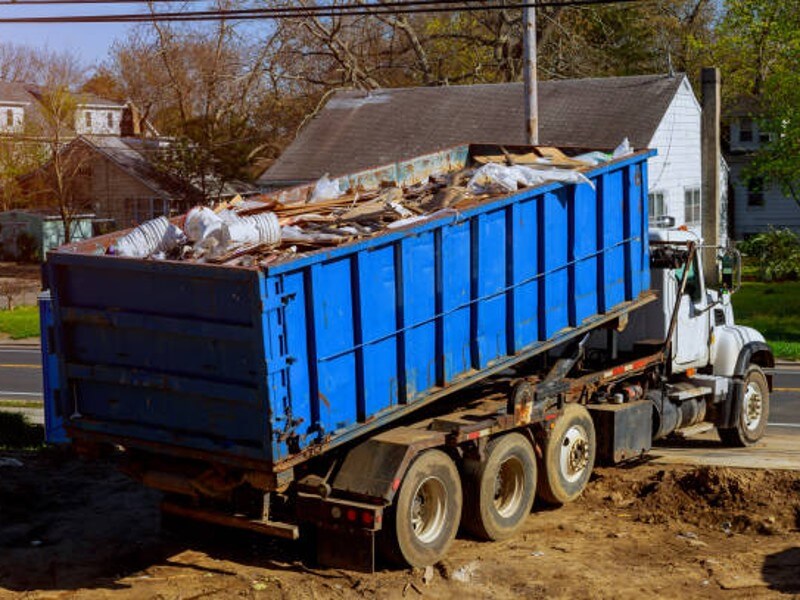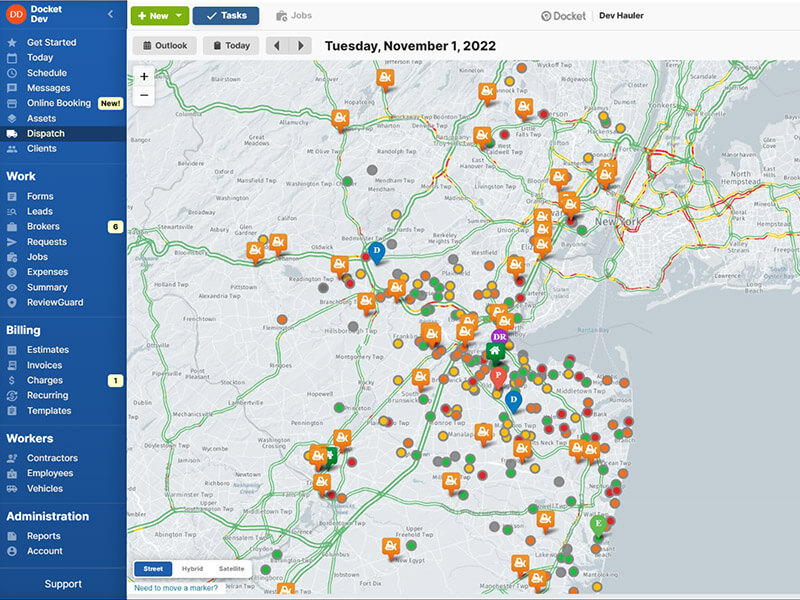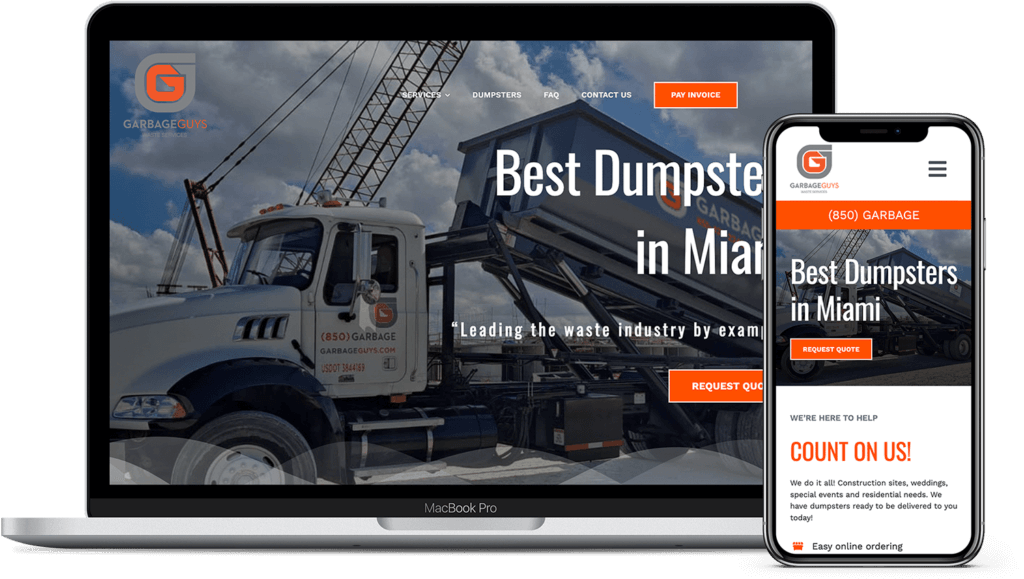Master Guide: How to Start, Operate and Grow a Successful Dumpster Rental Business
Understanding the Dumpster Rental Industry Landscape
Stepping into the dumpster rental business is an attractive prospect for many ambitious entrepreneurs. Like any other business, understanding the industry is your first step towards success.
The dumpster rental industry is a critical part of the waste management sector, serving a wide range of clients, from construction companies and commercial businesses to residential homeowners undertaking significant home improvement projects. A profound understanding of the different customer segments, their needs, and the existing competition is crucial.
A trend that’s important to acknowledge in this industry is the growing focus on environmental sustainability. As waste disposal practices come under scrutiny, dumpster rental businesses that offer eco-friendly options are garnering more attention. Staying on top of such trends can help you carve out a niche and stand out in a competitive landscape.
The dumpster rental industry, which forms an integral part of the broader waste collection services sector, has shown consistent growth over the years. As per data available until my knowledge cutoff in September 2021, the waste collection services market, including dumpster rentals, was growing at a compound annual growth rate (CAGR) of around 1.7% globally.
The growth in the dumpster rental industry can be attributed to several factors:
- Construction and Demolition Activities: Construction projects, whether residential or commercial, generate large amounts of waste that necessitate the use of dumpster rental services. With consistent growth in the construction industry, the demand for dumpster rentals has correspondingly increased.
- Home Renovation Trends: The increasing trend of home renovations and “do-it-yourself” projects has driven residential demand for smaller dumpsters.
- Environmental Regulations: Increasing focus on environmental regulations related to waste disposal has led to growth in this sector. It has become necessary for businesses and individuals to dispose of waste responsibly, which often involves using professional dumpster services.
- Population Growth and Urbanization: With population growth and urbanization, the generation of waste has increased, and the demand for waste disposal, including dumpster rentals, has gone up.
- Events and Festivals: Public events, festivals, and large gatherings often require dumpster services for waste disposal, contributing to the industry’s growth.
The dumpster rental business presents a lucrative opportunity due to these growing demands. Additionally, once established, it’s a business that offers steady cash flow and has the potential for high profit margins. The business model is relatively straightforward, and while it requires an upfront investment in equipment, the long-term earning potential is significant.
However, as with any business, success requires strategic planning, effective marketing, excellent customer service, and an understanding of both the regulatory environment and the competitive landscape. As society becomes more waste-conscious and the construction industry continues to flourish, the dumpster rental industry’s growth is likely to continue.
The Essentials of Crafting a Detailed Business Plan for Your Dumpster Business

No business can thrive without a solid plan. Your business plan is a roadmap, outlining your business goals, the strategies to achieve them, and the resources required. It’s a tool to help guide your decision-making process and track your progress.
When drafting a business plan for your dumpster rental business, start with a comprehensive market analysis. Understand the demand for dumpster rental in your chosen location, get to know your competition, and identify your target customer base.
Next, outline your business structure, including the number and types of dumpsters you plan to offer, pricing strategies, and marketing plan. Another crucial element is your financial projections, including initial investment, projected revenue, and expenses.
Remember, your business plan isn’t set in stone. It’s a dynamic document that you should revisit and revise as your business grows and market conditions change.
Example Business Plan:
Executive Summary:
John Doe Dumpster Rentals is a new enterprise seeking to provide dumpster rental services in Springfield, USA. Our target market includes construction firms, commercial establishments, and residential homeowners who require waste disposal services for projects.
Company Description:
John Doe Dumpster Rentals is a Limited Liability Company owned by John Doe. We provide a range of dumpsters to cater to various waste disposal needs. Our competitive advantage lies in our commitment to reliable, prompt service, and environmentally-friendly waste disposal practices.
Market Analysis:
Springfield has seen a surge in construction and renovation activities over the past few years. With a population of 500,000, the potential demand for dumpster rentals is significant. Our main competitors are XYZ Dumpster Rentals and ABC Disposal Services, both of which have a strong presence but lack focus on eco-friendly practices.
Organization and Management:
John Doe Dumpster Rentals will be managed by the owner, John Doe, who has 15 years of experience in waste management. We plan to hire a team of drivers and customer service representatives.
Services:
We will offer roll-off dumpster rentals in various sizes to meet different waste disposal needs. Our services also include dumpster delivery, pick-up, and disposal.
Marketing and Sales Strategy:
We will use both offline and online marketing channels. We plan to develop partnerships with local construction companies and run digital ads targeting local homeowners planning renovations. Our sales strategy relies on competitive pricing and exceptional customer service.
Financial Projections:
Based on market analysis, we project revenues of $500,000 in the first year, with costs estimated at $300,000, resulting in a net profit of $200,000. The initial investment will be $150,000, used for acquiring dumpsters and a delivery truck, and setting up the office.
Steps to Create a Simple Business Plan:
- Executive Summary: Provide an overview of your business. Include the name, location, services, and mission statement.
- Company Description: Describe your business in more detail. Include your business structure, ownership, and competitive advantages.
- Market Analysis: Research and provide information on your industry, target market, and competition. Use this analysis to identify opportunities and threats.
- Organization and Management: Outline your business structure and management. Include information about your team, their roles, and their qualifications.
- Services or Product Line: Describe the services you’re offering. Discuss the benefits of your services and how they fulfill a market need.
- Marketing and Sales Strategy: Outline your strategy for attracting and retaining customers. Discuss your sales process and how you’ll approach marketing.
- Financial Projections: Provide a financial forecast for your business. Include your expected revenue, expenses, and profitability.
Remember, your business plan should be clear, concise, and detailed enough to guide your business decisions.
Equipment and Capital Needs: Essential Investments for Your Dumpster Business

The dumpster rental business is capital-intensive, and having a clear understanding of your equipment and capital needs is essential.
Your primary investment will be in dumpsters and delivery trucks. The number and size of dumpsters you’ll need will depend on your market analysis and the customer base you aim to serve. The same goes for delivery trucks; you need to ensure they are reliable and capable of transporting your dumpsters safely.
Other equipment includes safety gear for your employees and potentially a warehouse or storage facility for your dumpsters. It’s also essential to set aside funds for routine maintenance and repairs, necessary for the longevity of your equipment.
Real-World Equipment Costs:
Dumpsters: The cost of dumpsters can vary greatly depending on their size and type. On average, you can expect to pay between $1,000 to $4,000 per dumpster. For instance, a new 10-yard roll-off dumpster can range from $2,500 to $3,500.
Delivery Trucks: A used roll-off truck can cost anywhere from $60,000 to $150,000, depending on its age, mileage, and condition. New trucks will be significantly more expensive, potentially costing over $200,000.
Safety Gear: The cost of safety equipment like gloves, safety boots, and high-visibility vests can range from $100 to $200 per employee.
Storage Facility: Depending on your location and the size of the space, the cost of a storage facility can range from a few hundred to several thousand dollars per month. Alternatively, you could purchase land and build your own facility, which could cost several tens of thousands of dollars.
Recommended Starting Capital:
Considering the costs of dumpsters, delivery trucks, safety equipment, and storage facilities, you would ideally want to have a starting capital of around $150,000 to $200,000. This should cover the initial equipment costs and leave some capital for operating expenses such as marketing, maintenance, and potential unexpected costs.
However, remember that these are approximate values and actual costs can vary significantly based on location, specific equipment choices, and whether you opt to buy new or used equipment. It’s crucial to do a thorough cost analysis before starting your business.
Regulatory and Legal Framework: What You Must Know Before Starting Your Dumpster Business
Before you can launch your dumpster rental business, you need to navigate the regulatory and legal landscape. This will include obtaining necessary permits and licenses, adhering to local and national waste management regulations, and understanding zoning laws for your storage facilities.
Also, your business will need to be properly insured to protect against potential liabilities. Legal compliance is not just mandatory; it protects your business and builds trust with your customers.
Remember, each city and state may have different rules and regulations, so it’s essential to do thorough research and possibly consult with a legal expert.
This master guide is designed to give you a robust understanding of what it takes to start, operate, and grow a successful dumpster rental business. As with any entrepreneurial venture, this business demands dedication, patience, and consistent efforts. But with the right approach and thorough preparation, your dumpster rental business can become a lucrative and rewarding venture.
Strategic Marketing in the Dumpster Business: Driving Demand and Building a Strong Brand
Once you’ve set up your dumpster rental business, attracting and retaining customers will be your next big challenge. That’s where strategic marketing comes into play.
Firstly, you need to establish a strong brand identity. Your brand is more than just your logo; it’s what people associate with your business when they hear your name. Craft a compelling mission statement, a professional logo, and a consistent color scheme to create a recognizable brand.
Your marketing strategy should be tailored to your target audience. Use both online and offline marketing channels. An online presence is crucial in today’s digital age; build a user-friendly website, maintain active social media profiles, and consider online advertising. Don’t underestimate the power of traditional marketing methods, though, such as networking, referrals, and local print advertising.
Finally, make customer satisfaction a part of your marketing strategy. Happy customers will spread the word about your business, providing the most effective marketing there is.
Effective Marketing Strategies and Their Costs:
Search Engine Optimization (SEO): SEO is a powerful tool that can increase your website’s visibility in organic search engine results. Implementing SEO involves optimizing your website’s content and design, as well as off-page elements like backlinks. Costs can vary greatly, from a few hundred to a few thousand dollars per month, depending on whether you do it in-house or hire a professional SEO agency. The effects of SEO can take several months to become evident but have long-term benefits.
Pay-Per-Click (PPC) Advertising: With PPC, you pay each time a user clicks on your ad, which appears on search engine results pages. Google Ads is the most popular platform for PPC advertising. Costs depend on the competition for your chosen keywords, but you can control your budget by setting a maximum bid and daily spend. The effects can be immediate, but PPC requires continuous investment for continued visibility.
Online Reviews and Ratings: Encourage your customers to leave reviews on websites like Google and Yelp. Positive reviews can significantly enhance your business’s reputation and visibility. It’s typically free to set up profiles on these platforms, but effort needs to be put into managing and responding to reviews. A reputation management service might charge a few hundred dollars per month. The effects can be seen relatively quickly, as soon as reviews start to accumulate.
Social Media Advertising: Advertising on platforms like Facebook and Instagram can help you reach a wider audience. Costs can vary based on the platform and audience targeting, but you can start with a budget as low as $5 per day. Social media ads can provide immediate results in terms of brand visibility and website traffic.
Content Marketing: Creating relevant and valuable content (blogs, videos, infographics) can help attract and retain an audience. Costs depend on the type of content and frequency of publication, and whether you create it in-house or outsource it. Content marketing is a long-term strategy, but it can greatly enhance your brand’s reputation and SEO over time.
Remember, the most effective marketing strategy usually involves a mix of different methods tailored to your specific business and audience. It’s essential to regularly review and adjust your strategy based on its performance.
Pricing Your Dumpster Rental Services: Balancing Competitiveness and Profitability

Pricing is a critical factor in the success of your dumpster rental business. Set your prices too high, and you’ll lose customers to your competitors. Set them too low, and you might not make enough profit to sustain your business.
First, understand your costs. These include operational costs, such as labor, fuel, and maintenance, and fixed costs like insurance, licensing, and equipment financing. Once you know what it costs to provide your service, you can determine a pricing structure that covers your expenses and provides a reasonable profit margin.
Research your competition to understand the going rates in your area. While you don’t need to be the cheapest, your prices should be competitive.
Remember, pricing is not just about numbers. It’s also about perception. If your services provide excellent value, customers will be willing to pay a little more.
Building a Loyal Customer Base: The Cornerstone of Your Dumpster Business Success
Building a loyal customer base is one of the most effective ways to ensure long-term success for your dumpster rental business.
Providing excellent customer service is key. Be responsive, address problems promptly, and always follow through on your promises. These actions will build trust and encourage customers to keep coming back.
Consider implementing a loyalty program. This could be something as simple as offering discounts to repeat customers. Not only will this encourage customer loyalty, but it will also provide an incentive for customers to refer others to your business.
Lastly, never underestimate the power of customer feedback. Regularly ask your customers for feedback and make improvements based on their responses. Not only will this show customers that you value their opinions, but it will also provide valuable insights into how you can improve your services.
In the dumpster rental business, as in any other, satisfied customers are the best advertisement. Prioritize customer satisfaction, and you’ll be well on your way to building a loyal customer base.
Customer Reviews: The key to growing your business
Customer reviews can significantly influence the perception of your business and shape potential customers’ decisions. Good reviews signal that your dumpster rental business is reliable and can deliver quality services, enhancing your reputation and building trust with potential customers.
Moreover, reviews provide you with valuable feedback that can help you understand your customers’ needs better and improve your services. Responding to reviews, both positive and negative, shows customers that you value their opinions, enhancing customer loyalty.
Here’s an example of an email you can send to customers to encourage them to leave a review on Google Business:
Subject: We’d Love to Hear Your Feedback!
Dear [Customer’s Name],
Thank you for choosing [Your Company Name] for your dumpster rental needs. We hope you were satisfied with our services.
Your feedback is extremely valuable to us, and we’d be grateful if you could take a couple of minutes to share your experience on Google. Reviews from valued customers like you help others know what to expect when they’re looking for a dumpster rental service, and it helps us continue improving our services.
Here’s the link to leave a review: [Link to your Google Business review page]
We appreciate your time and thank you for your support.
Best Regards,
[Your Name] [Your Position] [Your Contact Information]Remember to customize this template to reflect your brand’s voice and personality. Also, ensure that you follow up on reviews received and thank the customers for their feedback.
Opportunities for Expansion and Growth: Taking Your Dumpster Business to the Next Level
After establishing your dumpster rental business, the next step is to consider opportunities for expansion and growth. This could involve extending your services to new geographic areas, adding different dumpster sizes or types to cater to a wider range of customer needs, or even offering additional related services.
Expanding your business often involves additional investment, so careful planning is required. Consider the demand for your services in the potential expansion area, and perform a thorough cost-benefit analysis.
It’s also essential to maintain the quality of your service during the expansion. Rapid growth can sometimes lead to a decline in service quality, so ensure you have the necessary resources and processes in place to maintain your standards.
Profitability in the Dumpster Rental Business: Understanding Revenue Streams and Cost Structures
Understanding your revenue streams and cost structures is crucial for profitability in the dumpster rental business.
Your primary source of revenue will be the rental fees from dumpsters. However, there may be opportunities to add additional revenue streams, such as offering related services or selling products related to your business, such as waste bags or protective gear.
On the other side of the equation, you’ll have both fixed costs, such as equipment purchase and maintenance, and variable costs, such as fuel and labor. Monitoring these costs and finding ways to reduce them without compromising the quality of service is key to improving profitability.
Analyzing your financial performance regularly can help you identify trends, anticipate problems, and make informed decisions about pricing, cost control, and investment in growth.
Case Studies: Lessons from Successful Dumpster Rental Businesses
Add some case studies here
The Importance of Insurance and Liability in the Dumpster Rental Business: Understanding Risk Management
Operating a dumpster rental business comes with inherent risks, including damage to property, workplace accidents, and potential legal disputes. Therefore, understanding risk management and the importance of insurance and liability is crucial.
Different types of insurance coverage you may need include general liability insurance, commercial auto insurance, and workers’ compensation insurance. It’s advisable to consult with an insurance agent to ensure you have the right coverage.
Aside from insurance, adopting safe work practices and providing adequate training for employees can mitigate the risks. Furthermore, clear contracts with customers outlining the terms and conditions of the dumpster rental can help manage liability.
Technology and the Dumpster Rental Business: Leveraging Software and Digital Tools for Efficiency

Technology plays an increasingly important role in the dumpster rental business, helping increase efficiency, improve customer service, and streamline operations.
Software solutions can assist in various aspects of your business, from managing bookings and scheduling pickups and deliveries, to invoicing and accounting. GPS tracking technology can help manage your fleet of delivery vehicles more effectively.
Digital marketing tools, including social media platforms and SEO, can also be leveraged to reach more potential customers.
Embracing technology can give your dumpster rental business a competitive edge, reducing manual work, minimizing errors, and enhancing overall efficiency.
Dealing with Waste: Environmental Considerations and Compliance in the Dumpster Rental Business
As a dumpster rental business, how you deal with waste is not only a practical concern but also an environmental one. Furthermore, there are often local and federal regulations to comply with.
Ensure that waste disposed of in your dumpsters is handled correctly. This might involve working with licensed waste disposal facilities or offering specialized dumpsters for recyclables or hazardous waste.
Stay informed about local and federal environmental regulations to avoid fines and legal issues. This might include regulations about the disposal of certain types of waste, restrictions on where dumpsters can be placed, or requirements for waste tracking or reporting.
Promoting environmentally friendly practices can also be good for business, as many customers today prefer to work with businesses that demonstrate a commitment to sustainability.
The Role of Customer Service: Enhancing Customer Experiences in Your Dumpster Rental Business
Customer service is a critical aspect of any successful dumpster rental business. It doesn’t just mean addressing issues or answering queries but enhancing overall customer experiences.
A quick response time, transparent communication, and a problem-solving approach can win customer trust. Going the extra mile by offering flexibility with rental terms or providing advice on dumpster sizes can set you apart from competitors.
Don’t underestimate the power of reviews and referrals. Satisfied customers can become advocates for your business, sharing their positive experiences with others and leading to new customers.
Managing Operations: Logistical Considerations in the Dumpster Rental Business
Managing operations effectively is vital in the dumpster rental business, where logistical challenges are a daily reality. Successful scheduling, efficient routing, timely pickups and deliveries, and fleet management all play a crucial role.
Leveraging technology, such as route planning software, can enhance operational efficiency. Regular maintenance of your dumpsters and vehicles is crucial to prevent breakdowns and service disruptions.
Moreover, developing effective systems for inventory management and quality control can ensure you always have dumpsters available when customers need them, and that they are in good condition.
The Economic Impact and the Future Trends of the Dumpster Rental Industry
The dumpster rental industry has a significant economic impact, providing vital services to construction, commercial, and residential sectors. However, like any industry, it’s subject to changing trends and market forces.
The industry’s future trends may be shaped by factors like advances in technology, changing waste management regulations, and societal shifts towards greater environmental consciousness. Staying informed about these trends can help you position your business for future success.
For instance, new technologies may enable more efficient operations, while an increased focus on recycling and sustainability could open up new business opportunities. Being adaptable and ready to evolve with these trends is key to the longevity and success of your dumpster rental business.
Building a Team: Hiring and Managing Employees in Your Dumpster Rental Business
In the dumpster rental business, having a reliable and efficient team can be a significant asset. This involves hiring the right people and managing them effectively.
When hiring, look for employees who are not only capable of performing their job roles but also align with your business’s core values. Once you’ve hired a team, provide them with the necessary training to ensure they can perform their roles effectively and safely.
Effective management involves clear communication, fair compensation, and fostering a positive work environment. Regularly recognize and reward your employees for their hard work and dedication to motivate them and boost their morale.
Understanding Competition: Analyzing Your Competitors in the Dumpster Rental Business
In any business, understanding your competition is vital, and the dumpster rental business is no exception.
Start by identifying who your direct competitors are. These could be other local dumpster rental businesses or larger, national companies that operate in your area. Then, analyze their business model, pricing, services, and customer reviews to understand their strengths and weaknesses.
This analysis will help you identify opportunities to differentiate your business, whether it’s through better customer service, competitive pricing, unique services, or other means. Remember, the goal isn’t necessarily to beat your competitors at their own game, but to find ways to make your own business stand out.
Financing Your Dumpster Rental Business: Exploring Funding Options

Starting and running a dumpster rental business can require significant capital investment, particularly for purchasing equipment like trucks and dumpsters. Therefore, exploring and understanding various financing options is critical.
These might include traditional bank loans, equipment financing or leasing, small business grants, or even personal savings. Each has its pros and cons, so it’s important to do thorough research and consider consulting with a financial advisor.
Additionally, proper financial management, such as keeping track of expenses, managing cash flow effectively, and maintaining good credit, can help ensure your business remains financially healthy and increases your chances of securing financing when needed.
Tax Considerations for Dumpster Rental Business Owners
As a dumpster rental business owner, understanding tax obligations is vital. You may be subject to various federal, state, and local taxes, including income tax, sales tax, and possibly property tax if you own commercial property.
Keep accurate records of your income and expenses, as these can affect your tax liabilities. Certain business expenses may be deductible, reducing your taxable income.
Consider working with a tax professional who can help you navigate the complex tax landscape, ensuring you comply with all regulations and take advantage of any tax-saving opportunities.
Choosing the Right Location for Your Dumpster Rental Business: Understanding the Impact of Geographical Factors
The location of your dumpster rental business can significantly impact its success. You need to be close enough to your customer base to provide prompt and cost-effective service.
Consider factors such as local demand for dumpster rental services, competition, and accessibility. Areas with a high concentration of commercial businesses, construction activity, or residential renovations may provide a steady stream of customers.
Remember, your location will also affect your operating costs, including fuel costs and any local taxes or licensing fees.
When selecting a location for your dumpster rental business, it’s crucial to perform a detailed analysis. This will involve identifying potential locations, gathering data, and evaluating each location based on a set of criteria. Here are the steps you can follow:
- Identify Potential Locations: Start by identifying potential locations where you could set up your business. These could be cities, towns, or specific neighborhoods within a larger urban area.
- Gather Data: Use sources like local chamber of commerce websites, city data portals, real estate websites, and even local newspapers to gather data about each potential location. You can also contact the local waste management regulatory agency for any data related to waste management in the area.
- Evaluate the Demand: Look for indicators of high demand for dumpster rental services. These could include high levels of construction activity (you can often find this data from local zoning and planning departments), a large number of commercial businesses, and a high rate of home sales (which could indicate a demand for dumpsters for move-outs or renovations).
- Assess the Competition: Identify the number of existing dumpster rental businesses in the area. If the market is saturated, it might be challenging to get a foothold. However, if there’s little competition and high demand, it could be an excellent opportunity.
- Consider Accessibility: The location should be accessible for your delivery trucks, close to major roads or highways, and within a reasonable distance from your target market to keep delivery and pickup costs down.
- Examine Local Regulations and Fees: Check with local city or county offices to understand any regulations, zoning restrictions, or licensing requirements that could impact where you can set up your business and how you operate.
- Analyze Costs: Lastly, consider the costs associated with each potential location. This can include rent or purchase price of the property, property taxes, insurance rates, and operational costs like fuel for deliveries.
- Make a Decision: Based on the data collected, you can now make an informed decision about the best location for your business.
This analysis is crucial because the right location can significantly contribute to the success of your dumpster rental business. It’s always worth the time and effort to thoroughly research and analyze potential locations before making a decision.
Handling Maintenance and Repairs: Ensuring the Longevity of Your Equipment

Proper maintenance and timely repairs are essential for ensuring the longevity of your equipment in a dumpster rental business. This includes not only your dumpsters but also your trucks and any other equipment you use.
Regular inspections can help detect and address any potential issues before they turn into costly repairs. Keep a maintenance schedule and stick to it.
Ensure your team is trained to use the equipment safely and correctly to prevent unnecessary wear and tear or damage. When repairs are needed, weigh the cost of repair against the cost of replacement to make the most economical decision.
Building Relationships with Local Businesses: A Strategy for Consistent Business
Creating strategic relationships with local businesses can be a key driver of consistent business in the dumpster rental industry. Construction companies, home renovation businesses, commercial establishments, and event planners often require dumpster services.
Build relationships through networking events, local business associations, or direct outreach. Offering discounted rates for repeat business or referral incentives can encourage ongoing relationships.
Remember, fostering these relationships isn’t just about selling your services; it’s about offering solutions that meet their needs and building trust over time.
Dumpster Types and Sizes: Meeting the Varied Needs of Your Customers
Different customers have different needs when it comes to dumpster rental, and offering a variety of dumpster types and sizes can help you serve a wider customer base.
Whether it’s small dumpsters for home cleanouts, larger roll-off dumpsters for construction sites, or specialized dumpsters for certain types of waste, understanding your customers’ needs is key.
Providing advice on the right dumpster size for a project can add value to your service and ensure customer satisfaction.
Dumpster sizes can vary greatly depending on their intended use. Here are some common dumpster sizes and what they’re typically used for:
- 10 Yard Dumpsters: These small dumpsters are perfect for smaller home projects like spring cleaning, minor renovations, or cleaning out a small basement or garage. They’re about 12 feet long, 8 feet wide, and 3.5 feet high.
- 20 Yard Dumpsters: These dumpsters are suitable for slightly larger projects like cleaning out a larger basement or garage, small home additions, or roofing projects. They’re approximately 22 feet long, 8 feet wide, and 4.5 feet high.
- 30 Yard Dumpsters: These dumpsters are typically used for commercial construction projects, major home additions, or extensive home cleanouts. They’re about 22 feet long, 8 feet wide, and 6 feet high.
- 40 Yard Dumpsters: These are the largest dumpsters available and are typically used for large construction or demolition projects, major renovations, or large home cleanouts. They’re approximately 22 feet long, 8 feet wide, and 8 feet high.
If you’re just starting your dumpster rental business and can only afford to purchase one size dumpster initially, the 20-yard dumpster could be a versatile choice. This is a middle-of-the-road option that could suit a variety of different project sizes, making it a more flexible choice until you can expand your inventory.
However, the best size to start with will ultimately depend on your specific market research. If your target customer base is primarily homeowners doing small cleanouts or minor renovations, a 10-yard dumpster might make the most sense. Conversely, if you’re servicing more commercial clients or construction sites, you might want to invest in larger 30- or 40-yard dumpsters.
Safety Protocols and Training: Protecting Your Team and Your Business
Safety should be a top priority in the dumpster rental business, which involves the handling of heavy equipment and potentially hazardous materials.
Establishing clear safety protocols and providing regular safety training for your team can help prevent accidents and injuries. This might include training on proper lifting techniques, guidelines for loading and unloading dumpsters, and procedures for handling hazardous waste.
Remember, maintaining a safe work environment is not only important for your employees’ wellbeing but can also protect your business from potential liability.
The Importance of a Strong Online Presence: Building a Website and Utilizing Social Media

In today’s digital world, your website serves as your primary sales representative. It’s often the first point of contact potential customers have with your business, making its design and functionality critical to converting visitors into customers.
A well-designed website should clearly communicate what your business offers, how it differentiates itself from competitors, and how customers can avail themselves of your services. Key features should include a simple navigation structure, clear and persuasive content, easy-to-use contact forms, and seamless integration with social media platforms.
On top of a robust website, establishing a presence on social media platforms allows you to connect with potential customers, share updates, and build your brand. Be sure to post regular updates and engage with your followers to build relationships and encourage loyalty.
Moreover, using tools like Google Analytics can provide valuable insights into your website’s performance, helping you understand your audience better and optimize your sales funnel. It allows you to see where your traffic is coming from, what pages users are spending time on, and at what point they decide to leave your site, among other useful data.
As for the costs associated with building and managing a website, they can vary widely based on your specific needs. For a basic website built by a professional web designer, you could be looking at a starting cost of around $3,000 – $6,500. More complex websites with advanced features can easily go over $12,000. Keep in mind that there will also be ongoing costs for website hosting and maintenance, which can range from $50 to a few hundred dollars per month.
However, investing in a quality website and robust online presence is not an area where you want to skimp. It’s a crucial component of your marketing strategy and can significantly contribute to the growth and success of your dumpster rental business.
A robust online presence is fundamental to the success of any modern business, and a dumpster rental business is no exception. Building a professional website and strategically utilizing social media platforms can help attract and retain customers, build brand recognition, and drive sales.
Website
Your website serves as the digital storefront for your dumpster rental business. It’s often the first point of contact for potential customers, so it needs to be user-friendly, professional, and informative. Essential elements to include on your website are:
- Description of your services
- Information about the different types and sizes of dumpsters you offer
- Pricing details, if applicable
- Contact information
- About us page
- FAQ section
- Testimonials and reviews from satisfied customers
A well-optimized website is also crucial for SEO (search engine optimization), helping your business rank higher on search engine results pages and making it easier for potential customers to find you.
Social Media
Different social media platforms cater to different demographics, so understanding who your target customers are will help you decide which platforms to focus on.
Facebook: With over 2 billion users, Facebook reaches a broad demographic, making it a versatile platform for businesses of all types. You can create a business page, post updates, engage with your audience, and even advertise your services.
Instagram: Instagram’s audience is younger and more visually-oriented. This platform is excellent for businesses with visually appealing products or services. In the dumpster rental business, you could post before-and-after pictures of cleanups, showcase your range of dumpsters, or share behind-the-scenes looks at your operations.
LinkedIn: LinkedIn is a professional networking platform, making it a good place to connect with other businesses in your area that may need dumpster rental services, such as construction companies, event planners, or property management companies.
Twitter: Twitter is a fast-paced platform that’s great for short updates, linking to blog posts, and quickly responding to customer queries or comments.
YouTube: If you have the resources to create video content, YouTube is a powerful platform. You could create how-to videos, informational content about your dumpsters, or testimonials from satisfied customers.
Regardless of the platforms you choose, consistency is key. Regularly post relevant, engaging content and interact with your followers to build a strong online presence.
Remember, building a strong online presence takes time and effort, but it’s an investment that can significantly boost your business’s visibility and credibility.
Strategic Partnerships and Affiliations in the Dumpster Rental Industry
Forming strategic partnerships and affiliations can help expand your dumpster rental business’s reach and credibility. Consider partnering with local construction companies, event planners, property management companies, and other businesses that regularly require dumpster services.
Joining industry associations can also provide networking opportunities, access to resources, and increased visibility in the marketplace.
Crisis Management: Preparing Your Dumpster Rental Business for Unforeseen Challenges
Every business can face unforeseen challenges, whether it’s economic downturns, natural disasters, equipment breakdowns, or public health crises. Having a crisis management plan in place can help your dumpster rental business navigate these challenges effectively.
This might involve maintaining an emergency fund, having backup suppliers, developing a communication plan to keep customers informed during a crisis, and ensuring your insurance policies are adequate to cover potential risks.
Remember, preparation is key to managing crises effectively and ensuring the continuity of your business.
Exploring Franchise Opportunities in the Dumpster Rental Industry
For those interested in starting a dumpster rental business, franchising can be a viable option. A franchise offers the advantage of a proven business model, brand recognition, and ongoing support from the franchisor.
However, it’s important to conduct thorough research and due diligence before investing in a franchise. Consider factors like the cost of the franchise, the terms of the franchise agreement, the level of support provided by the franchisor, and the track record of the franchise.
Franchising is not for everyone, and it’s essential to weigh the pros and cons before deciding if this path is right for you.
The Impact of Seasonal Factors on the Dumpster Rental Business

Like many businesses, the dumpster rental industry can be affected by seasonal factors. The demand for dumpsters may increase during periods of high construction activity, such as the summer months, or during periods of heavy residential clean-up, such as spring cleaning season.
Understanding these seasonal trends can help you plan your inventory, staffing, and marketing efforts accordingly. It can also highlight the need for diversification – by serving different market segments, you can ensure a steady stream of business throughout the year.
Also, consider strategies to manage off-peak seasons, such as offering discounted rates or targeting different types of customers.
FAQ
Choosing the right location for your dumpster rental business involves considering several factors. You should look for areas with a high demand for dumpster services – this could be areas with a lot of construction, commercial businesses, or residential renovations. Your location should also be easily accessible for your trucks to deliver and collect dumpsters. Consider the competition in the area as well – it might be harder to establish your business in an area with many established competitors. Lastly, consider your operating costs, including local taxes or licensing fees and fuel costs for your trucks.
Regular inspections and maintenance can help prevent costly repairs down the line. Create a maintenance schedule for your equipment and stick to it. This might include regular checks of your dumpsters for damage, as well as regular servicing of your trucks. Train your team to use the equipment safely and correctly, to prevent unnecessary damage. When repairs are needed, weigh the cost of the repair against the cost of replacement – sometimes, it may be more economical to replace damaged equipment.
Building relationships with local businesses involves identifying businesses that may require regular dumpster services – this could include construction companies, commercial businesses, event planners, or home renovation businesses. You could reach out to these businesses directly, offering your services and possibly offering discounted rates for repeat business. Networking events and local business associations can also be a good place to meet potential business partners. Remember, these relationships should be mutually beneficial, so consider how you can offer value to these businesses, not just how they can benefit you.
The types and sizes of dumpsters you should offer depends on your target market. If you’re serving residential customers, smaller dumpsters for home cleanouts or minor renovation projects may be in demand. For commercial customers or construction sites, larger roll-off dumpsters might be needed. Specialized dumpsters, such as those for yard waste or recyclable materials, might also be useful. Understanding your customers’ needs is key – you might conduct market research or simply ask your customers what types of dumpsters they would find most useful.
Safety protocols for a dumpster rental business should cover the handling of heavy equipment and potentially hazardous materials. This could include training on correct lifting techniques, guidelines for loading and unloading dumpsters, and procedures for handling hazardous waste. Regular safety training should be provided to all team members to ensure these protocols are followed. It’s also a good idea to have procedures in place for dealing with any accidents or injuries, should they occur.
Building a strong online presence for your dumpster rental business starts with a well-designed, user-friendly website. The website should provide information about your services, pricing, and contact information. If possible, offering online booking can be a convenient feature for customers.
Social media is another important aspect of your online presence. Regularly posting updates about your business, engaging with your customers, and providing useful information can help build your brand and reach a wider audience. You might also consider search engine optimization (SEO) techniques to improve your website’s visibility on search engines.
In the dumpster rental industry, strategic partnerships can help expand your business and increase its reach. Partnerships with construction companies, event planners, property management companies, and renovation businesses can lead to regular, ongoing work. You can also consider partnerships with waste management companies or recycling facilities to handle the disposal of waste collected in your dumpsters. Another type of partnership could be with other local businesses for mutual promotion or with a trucking company for equipment transportation.
To prepare your dumpster rental business for unforeseen challenges or crises, it’s important to have a solid business continuity plan. This includes having insurance to cover damages or losses, maintaining a reserve fund for emergencies, and developing a crisis communication plan to keep employees and customers informed. Regular risk assessments can help identify potential vulnerabilities in your business and allow you to put preventive measures in place. Additionally, diversifying your customer base and services can also help mitigate risks by not relying on a single revenue stream.
Yes, there are franchise opportunities in the dumpster rental industry. The advantages of choosing to open a franchise include the support and resources provided by the franchisor, the use of a recognized brand, and a proven business model. Franchisors may provide training, marketing support, and assistance with location selection and setup.
However, there are also disadvantages to consider. These can include the initial franchise fee and ongoing royalties, less autonomy over your business operations, and potentially restrictive franchise agreements. It’s also important to note that the success of the franchisor does not necessarily guarantee the success of your specific franchise location. As with any business decision, careful research and consideration are crucial.
Seasonal factors can significantly impact the dumpster rental business. For instance, construction projects are more common in warmer weather, leading to higher demand for dumpsters in spring and summer. Similarly, home cleanouts may increase during spring cleaning season or before the winter holidays. To prepare for these fluctuations, ensure your business has enough inventory to meet increased demand during peak times. Consider offering incentives or discounts during off-peak seasons to encourage more bookings. Having a diversified client base can also help balance out seasonal fluctuations.
Insurance is crucial in the dumpster rental business to protect against potential risks and liabilities. For example, if a dumpster causes property damage or if someone is injured while using your dumpster, liability insurance would cover the costs. Commercial auto insurance is also needed for your trucks that deliver and pick up dumpsters. Depending on the number of employees you have, workers’ compensation insurance may be required. It’s also a good idea to have property insurance to cover your office and any warehouse or storage space. A knowledgeable insurance agent can guide you to choose the right coverage for your specific needs.
Technology can be a game-changer for the dumpster rental business. Using scheduling software can streamline booking, delivery, and pick-up processes. Customer relationship management (CRM) tools can help manage customer interactions and improve customer service. GPS tracking for your delivery trucks can increase efficiency and provide real-time updates for your customers. Also, leveraging social media and online marketing can attract more customers. Finally, using software for accounting and invoicing can simplify your financial management and help you keep track of your business’s performance.
Environmental considerations are crucial for a dumpster rental business. This includes understanding and complying with local and federal laws regarding waste disposal. You should be aware of what types of waste can go into a dumpster and which need special disposal methods (like hazardous waste). Recycling is another important aspect – separating recyclable materials and partnering with recycling facilities can reduce the environmental impact. Promoting eco-friendly practices to your clients, such as waste sorting and recycling, can also be beneficial.
Enhancing customer experiences in your dumpster rental business can be done in several ways. Efficient booking, delivery, and pick-up processes are fundamental. Clear communication regarding pricing, dumpster use guidelines, and timelines is important. Quick response to customer queries and resolving issues promptly can also improve customer experience. Offering flexible rental periods or same-day delivery can set your business apart. Lastly, asking for customer feedback and acting on it can show customers that you value their input and are continually working to improve your service.
Logistical aspects in a dumpster rental business can include scheduling, inventory management, and route planning. Efficient scheduling ensures timely delivery and pick-up of dumpsters, which can improve customer satisfaction. Inventory management is crucial to ensure you have enough dumpsters to meet demand, especially during peak seasons. Route planning for your delivery trucks can save time and fuel costs. Leveraging technology, such as scheduling software or GPS tracking, can help manage these logistical aspects more effectively.
Future trends in the dumpster rental industry could include a continued focus on sustainability and recycling, the integration of more advanced technologies, and an increase in demand for residential dumpster services as home renovation trends continue. It’s crucial to stay updated on these trends to remain competitive and adapt your business accordingly. For instance, offering recycling services or using software to streamline operations could attract more customers and improve efficiency.
When hiring employees for your dumpster rental business, look for people with good communication skills, physical stamina, and a clean driving record, especially if they’ll be delivering and picking up dumpsters. Proper training is crucial to ensure they understand safety protocols and customer service standards. For managing employees, regular communication, offering competitive wages and benefits, recognizing good work, and providing opportunities for growth can help retain your staff and keep them motivated.
To analyze your competitors effectively, start by identifying who they are. Look at the services they offer, their pricing, marketing strategies, and customer reviews. You can learn a lot from their strengths and weaknesses. Staying updated on their activities can give you insights into new trends or changes in the industry. Also, understanding what makes your service unique can help you stand out. Tools like SWOT analysis (Strengths, Weaknesses, Opportunities, Threats) can be useful in competitor analysis.
Financing options for starting a dumpster rental business can include personal savings, bank loans, Small Business Administration (SBA) loans, business credit cards, and seeking investors or partners. Additionally, equipment leasing or financing can be an option to acquire dumpsters and delivery vehicles without a huge upfront investment. Grants for small businesses or green businesses may also be available. It’s advisable to consult with a financial advisor or business consultant to understand the best options for your specific circumstances.
As a dumpster rental business owner, you’ll need to understand several tax considerations. These include income tax, self-employment tax, property tax on your office or storage space, and sales tax if your state requires it on rental items. If you have employees, you’ll also need to consider payroll taxes. Tax deductions can be available for business expenses like equipment purchase, maintenance costs, office rent, and advertising. Keeping accurate records of your income and expenses is crucial. Consulting with a tax professional can help ensure you’re meeting all your tax obligations and taking advantage of applicable deductions.
The fundamental steps in starting a dumpster rental business include:
Understanding the industry and market demand
Creating a detailed business plan
Securing financing for startup costs
Obtaining necessary licenses and permits
Purchasing or leasing dumpsters and delivery vehicles
Setting up an office or storage space
Hiring and training employees if necessary
Establishing a marketing and customer acquisition strategy
Implementing operational processes for booking, delivery, and pick-up
Ensuring you have appropriate insurance coverage.
What should I include in my dumpster business plan?
Your dumpster business plan should include the following elements:
- Executive Summary: A brief overview of your business concept, objectives, and key strategies.
- Company Description: Details about your business, the services you’ll offer, and what makes your business unique.
- Market Analysis: Information about your target customers, local demand, and competition.
- Organization and Management: Your business structure, management team, and staffing plan.
- Services: Detailed description of your services, including the types and sizes of dumpsters you’ll offer.
- Marketing and Sales Strategy: How you plan to attract and retain customers.
- Financial Projections: An estimate of startup costs, ongoing expenses, expected revenue, and profitability.
- Funding Request: If you’re seeking financing, detail how much you need and what it will be used for.
The essential pieces of equipment for a dumpster rental business are dumpsters of various sizes and a roll-off truck to deliver and pick up the dumpsters. You may also need a storage yard to store the dumpsters when they’re not in use, as well as office equipment for managing bookings and customer service. The capital requirements will depend on the size of your operation, but you’ll need to consider costs for purchasing or leasing equipment, securing a storage yard, marketing, and operational expenses. It’s advisable to consult with a business advisor or accountant to help estimate your startup costs accurately.
Starting a dumpster rental business involves several legal and regulatory considerations. These include obtaining necessary business licenses and permits, complying with local zoning laws for your storage yard, and understanding regulations related to waste disposal. You’ll also need to secure appropriate insurance to protect your business from liability. If you plan to hire employees, you’ll need to comply with labor laws and payroll tax requirements. It’s advisable to consult with a lawyer to ensure you’re meeting all legal and regulatory obligations.
How can I market my dumpster rental business effectively to gain customers?
Effective marketing strategies for a dumpster rental business could include:
- Creating a Professional Website: Your website should showcase your services, pricing, and contact information. Incorporate SEO strategies to make your business more visible in online searches.
- Social Media Marketing: Use platforms like Facebook, LinkedIn, and Instagram to reach your target audience. Post regular updates, share useful information, and respond to customer queries promptly.
- Local SEO: Register your business with Google My Business and other online directories to improve your visibility in local search results.
- Networking: Participate in local business events and associations. Establish relationships with contractors, property managers, and others who might need or recommend your services.
- Offline Advertising: Consider traditional advertising methods like local newspapers, radio ads, or signage on your trucks to reach a broader audience.
How can I set competitive and profitable prices for my dumpster rental services?
Setting competitive and profitable prices for your dumpster rental services involves:
- Cost Analysis: Determine your costs for delivering and maintaining dumpsters, including fuel, labor, and maintenance.
- Market Research: Understand what competitors in your area are charging. While you don’t want to drastically undercut your competition, pricing competitively can help attract customers.
- Value-based Pricing: Consider the value you’re providing. If you’re offering superior service, such as faster delivery or better customer service, you may be able to charge a premium.
- Profit Margin: Decide on a profit margin that’s sustainable and allows for business growth. Be sure to factor in overhead costs like marketing, insurance, and administrative expenses.
How can I cultivate customer loyalty in my dumpster rental business?
Cultivating customer loyalty in your dumpster rental business can be achieved by:
- Providing Excellent Customer Service: Promptly respond to inquiries, resolve issues swiftly, and be friendly and professional. Happy customers are more likely to be repeat customers and refer others to your business.
- Offering Incentives: Consider customer loyalty programs, such as discounts for repeat business or referrals.
- Maintaining High Standards: Ensure your dumpsters are clean, sturdy, and delivered on time. Consistently high service standards can help build your reputation and customer loyalty.
- Asking for Feedback: Encourage customers to leave reviews, and take their feedback seriously. This can provide valuable insights for improving your service and shows customers that you value their opinion.
- Staying in Touch: Regular communication, such as email newsletters or social media updates, can keep your business top-of-mind for customers when they need dumpster rental services again.
What are the strategies to grow and expand my dumpster rental business?
Strategies to grow and expand your dumpster rental business could include:
- Adding New Services: Consider adding related services such as junk removal or recycling services to diversify your income streams.
- Geographic Expansion: As your business becomes profitable, consider expanding your service area or opening new locations.
- Investing in Marketing: A well-executed marketing campaign can significantly increase your customer base.
- Building Strategic Partnerships: Develop relationships with local businesses, real estate agencies, construction companies, and event planners who can refer customers to you.
- Upgrading Your Fleet: Adding more or larger dumpsters can help you serve more customers and take on larger jobs.
How can I ensure profitability in my dumpster rental business?
To ensure profitability in your dumpster rental business:
- Control Costs: Regularly review your expenses to identify cost-saving opportunities. This could include shopping around for suppliers, optimizing delivery routes, or improving maintenance practices to extend the life of your dumpsters.
- Set Competitive Prices: Your pricing should cover all your costs and allow for a reasonable profit. Regularly review your prices to ensure they remain competitive and reflect any changes in your costs.
- Boost Revenue: Look for ways to increase revenue, such as offering additional services, attracting more customers through marketing, or increasing repeat business by improving customer satisfaction.
- Monitor Financial Performance: Regularly review your financial statements to track your profitability and identify any issues early.
- Can you provide examples of successful dumpster rental businesses, and what can I learn from them?
Conclusion
Starting, operating, and growing a dumpster rental business can be a lucrative venture, given the industry’s steady demand across various sectors like construction, event planning, and home renovations. However, it requires thoughtful planning, strategic decisions, and dedicated effort to be successful.
Firstly, it’s crucial to have a deep understanding of the dumpster rental industry landscape. Familiarize yourself with the market size, key players, customer demands, and industry trends. This knowledge will form the basis of your business plan, a vital document that will guide your startup process and future operations. It will detail your business goals, target market, marketing strategies, projected finances, and operational procedures.
Equipment and Capital
One significant aspect of your plan is to identify the equipment and capital required to start your business. This includes purchasing different sizes and types of dumpsters, a reliable transport vehicle, and safety equipment. You must also factor in the costs of insurance and permits, as legal compliance is non-negotiable in this business.
On the topic of legality, understanding the regulatory framework of the dumpster rental business is paramount. Ensure you’re informed about zoning laws, waste disposal regulations, and any licenses and permits you’ll need. It’s also wise to consider legal guidance, especially when drafting contracts and agreements.
Marketing Strategies
Marketing strategies are another cornerstone for your dumpster rental business success. Utilize both online and offline methods to reach your target audience. Building a professional website and maintaining a strong social media presence are critical in today’s digital era. Simultaneously, traditional marketing tactics like signage on your trucks, print advertisements, or word-of-mouth referrals are still effective.
Pricing your services is a delicate balance between competitiveness and profitability. It would be best to consider your operating costs, market rates, and value offered to the customer while setting your prices. Remember, your goal is to provide superior service that justifies your rates, helping build a loyal customer base.
High Standard of Service
Maintaining high standards of service, excellent customer service, and offering incentives for repeat customers are ways to build this loyalty. Simultaneously, understanding your competition and the geographical factors impacting your business will help you make strategic decisions that contribute to business growth.
Moreover, expanding your business should be a part of your long-term plan. This expansion could take the form of geographical growth, diversifying services, or even considering franchising opportunities. However, remember that each new venture will bring its own set of challenges.
One such challenge is managing maintenance and repairs to ensure your equipment’s longevity. You must also be aware of safety protocols and train your team accordingly. Remember, a well-trained team is a safer and more efficient one.
Embracing Technology
Furthermore, embracing technology will aid in managing your operations more efficiently. Various software can help you with scheduling, route optimization, invoicing, and even customer relationship management. A strong online presence, besides being a marketing tool, can also provide convenience to your customers through online bookings and payments.
Being environmentally responsible is not only good for the planet but also for your business. Compliance with environmental regulations is mandatory, and showcasing your eco-friendly waste management practices can be a strong selling point for your services.
Planning For The Unexpected
Lastly, having a plan for unforeseen challenges or crises is vital. This can involve maintaining adequate insurance, having a cash reserve for financial crises, or having a contingency plan for operational disruptions. In the end, the resilience of your business will significantly depend on how well you prepare for such situations.
Starting a dumpster rental business is undoubtedly a significant undertaking, but with careful planning, strategic decision-making, and consistent effort, it can be a rewarding venture. Learn from successful businesses, stay informed about industry trends, and most importantly, keep your customers at the forefront of your operations. That will be your key to running a successful dumpster rental business.


